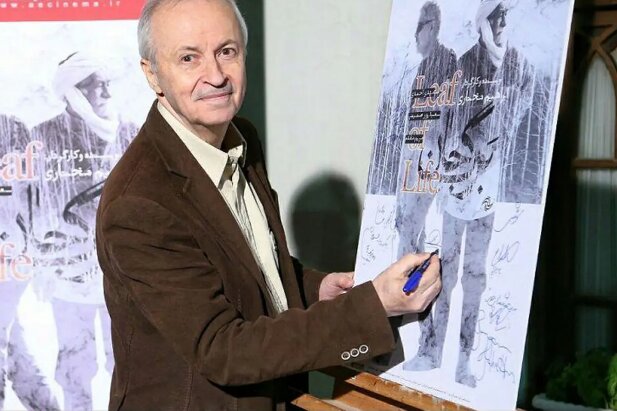
TEHRAN – Iranian filmmaker Ebrahim Mokhtari will serve as the president of the international jury of the 4th New Persian Images Festival, where a number of films from Iran will be screened.
Mokhtari, whose 1994 film “Zinat” will be shown in the out-of-competition section, will also receive the Golden Mithra award from the festival, which will run from November 5 to 11 in Vitré, France, ISNA reported.
Written and directed by Mokhtari, “Zinat” is the portrait of a courageous woman, caught between tradition and modernity, in a changing society.
In the movie, a young woman named Zinat, who works at a health center in rural Iran, is about to get married. Her fiancé Hamed’s family doesn’t want her to continue working after the wedding, and all of Zinat’s efforts to convince Hamed that her job won’t affect their family life are in vain. Zinat’s family is also opposed, fearing she’ll offend Hamed’s family.
Finally, Zinat agrees to quit her job. She gets married and throws herself into family life. The problems seem solved. But beneath the calm surface, conflicts are creeping into the relationship between Zinat and her husband.
One day, a woman brings a sick child to her for treatment and despite her husband’s disapproval, Zinat decides to help the child and takes him to the city for treatment.
Born in Babol, Mazandaran Province, Ebrahim Mokhtari, 78, is a graduate of Filmmaking from Tehran’s College of Film & Television. He started his film career at the Iranian TV and was first involved in two series as an assistant director.
Afterward, Mokhtari began making documentaries for the Iranian TV channels and established himself as one of the prominent documentary filmmakers in the country.
He made his first feature film, “Zinat,” in 1994, which was successfully shown at the Critics Week Section of Cannes `94. Leipzig Film Festival held a tribute to Ebrahim Mokhtari in 1997و and Rural Art & Literature Festival of Tehran presented him a Special Prize for his film career in 1999.
“Mokarrameh, Memories and Dreams” (1999) and “Leaf of Life” (2017) are among his other notable movies.
He was one of the members of the founding board to establish the Iranian Documentary Filmmakers Association, and in the first three years, he was the chairman of the board.
This year’s edition of the New Persian Images Festival will screen 10 films by Iranian filmmakers in various sections in addition to Mokhtari’s “Zinat”.
Four feature-length fiction films are participating in the competition of the 4th edition in order to obtain the International Jury Prize or the Audience Award.
All the films are either new or recent and are programmed as French or world premieres during the festival. They include “Asteroid” written and directed by Mehdi Hoseinivand Aalipour, “I’m scared” by Behnam Behzadi, “The Locust” by Faeze Azizkhani, and “That Wind that Shakes the Sugar Canes” by Ebrahim Ashrafpour.
“Asteroid” depicts Ebrahim, a 12-year-old boy who lives with his mother and five siblings of all ages in a two-room hut in the heart of the desert, far from the village. Besides feeding the children and obtaining their birth certificates, Ebrahim and his mother’s main concern is building a house in the village to avoid making the long trek back and forth on foot.
“I’m scared” deals with Bahman, a poet living in the chaotic city of Tehran. Recently, he has faced a series of life’s challenges: He is losing the ownership of his shop; and he is constantly being followed by a motorcyclist.
Overwhelmed by this situation, he can no longer write poetry and has become increasingly isolated and fearful. In a society where the rich and powerful dictate the rules, Bahman must either find the courage to fight against injustice or accept humiliation and lose everything.
In “The Locust,” Hanieh is a broke woman in her forties, about to be evicted from her apartment by her landlord. For years, she has been trying to make a film based on her own semi-autobiographical screenplay. Having accepted the impossibility of realizing her dream, she has no choice but to sell the script to one of her best friends, who is capable of directing it.
Deeply attached to her work, Hanieh will not tolerate any indifferent or ignorant reactions during the pre-production phase, but she decides not to get involved in a conflict with the director, the actors, and the crew. However, the situation spirals out of control.
“That Wind that Shakes the Sugar Canes” shows Younes’s father, who is arrested when the sugar factory owner accuses him of setting fire to the sugarcane fields. Eleven-year-old Younes discovers that on the night of the accident, his father, a prominent figure in the strikes and demonstrations, was in a meeting with the other workers to discuss their demands.
He then tries to bring the witnesses to court. This is the starting point of his journey: to forget his passion for football and to ease his family’s burden.
The short film selection includes three films. High school and university students will award the Arts and Cultural Education Prize to the winner following the vote.
“Out of Tune” directed by Vahid Mazrae, “Vermin” by Tina Dehghan, and “When, Where, Who, Why” by Roozbeh Hesari are the Iranian films in the short films section.
In “Out of Tune,” a man earns his living on the street by whistling songs for passersby. However, one of his customers makes a different request, unexpectedly challenging him.
“Vermin” depicts a young weaver struggling to overcome her fear of touch, moving into a carpet-weaving workshop. Soon, she becomes obsessed with her neighbor, a handsome and extroverted musician.
In “When, Where, Who, Why,” a young artist plans to travel to Europe to participate in a painting exhibition. Along with showcasing her work, she hopes to accompany her best friend, Aban, who has been her lifelong companion. However, she discovers that her father has refused her permission to leave the country.
In the documentary section, three documentaries by Iranian filmmakers will be screened including “Spring” by Nahid Rezaee, “Eastwood” by Alireza Rasoulinejad, and “Put Your Soul on Your Hand and Walk” by Sepideh Farsi.
In “Spring,” the filmmaker documents the creation of a children’s library in a remote village in Baluchestan, a region in southeastern Iran, 1,800 kilometers from Tehran. Through this project, she introduces the village’s girls and boys to writing stories inspired by their local culture, as well as to making short films.
“Eastwood” follows the story of an amateur filmmaker who, after seeing a photograph in a newspaper, heads to southern Iran to find the person resembling Clint Eastwood.
“Put Your Soul on Your Hand and Walk” is the filmmaker’s response to the ongoing massacres of Palestinians. She met Fatima Hassouna who became her eyes in Gaza, where she resisted by documenting the war, and Farsi became a link between her and the rest of the world. Hassouna was assassinated on April 16, 2025, following an Israeli attack on her home.
Founded in 2019, the New Persian Images festival aims to introduce Iranian culture to a wider audience through film, literature, and music.
Photo: Ebrahim Mokhtari at the premiere of his second feature film “Leaf of Life” at the Cinema Museum of Iran in Tehran in 2017.
SS/SAB
Disclaimer : This story is auto aggregated by a computer programme and has not been created or edited by DOWNTHENEWS. Publisher: tehrantimes.com






